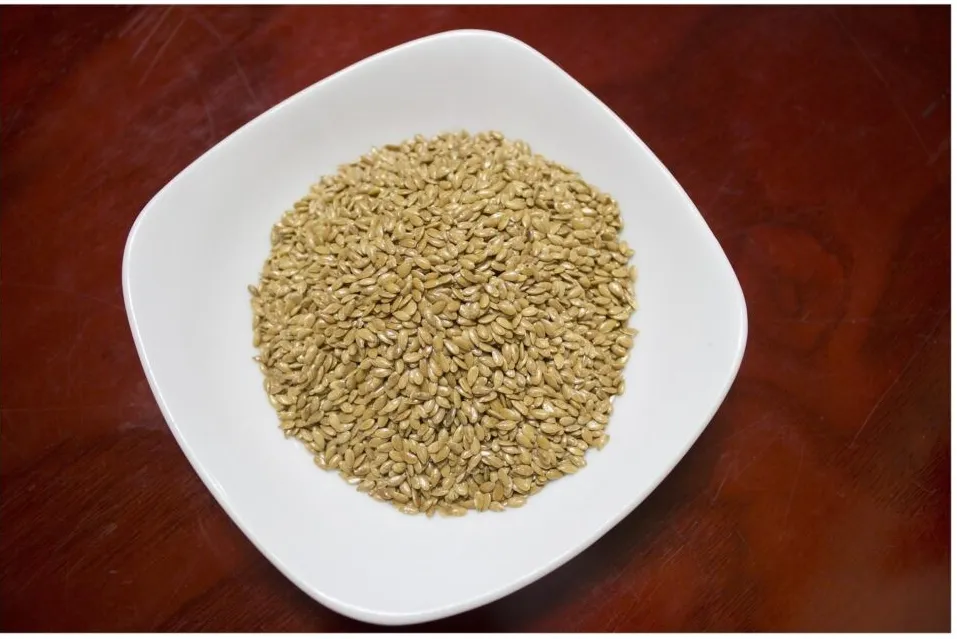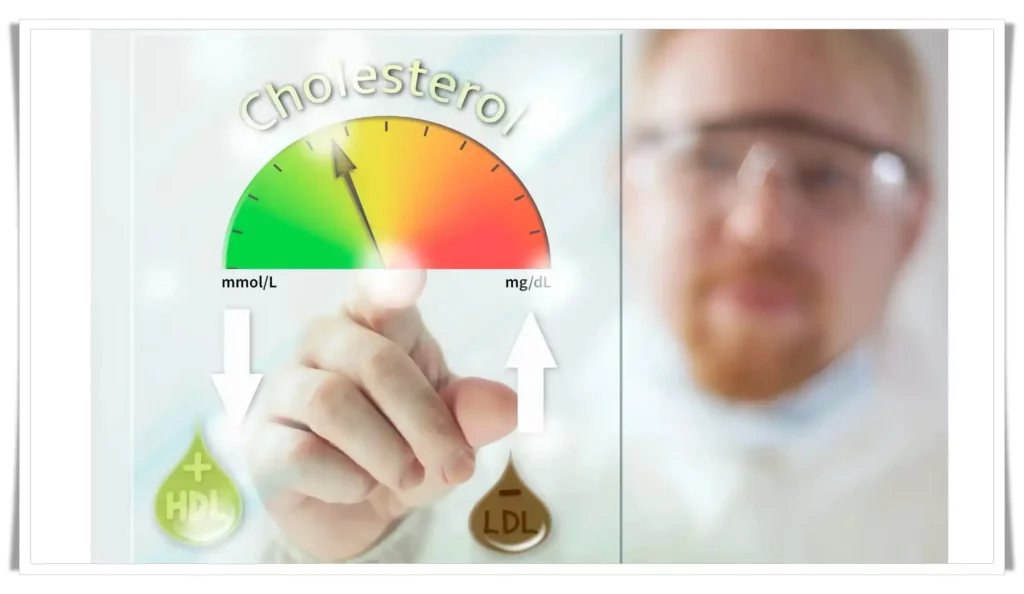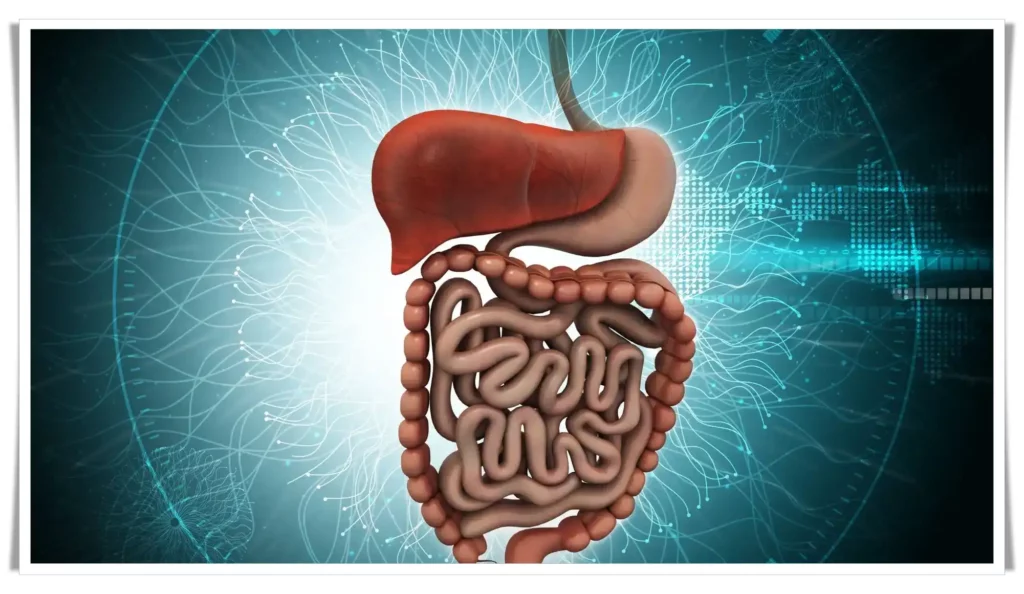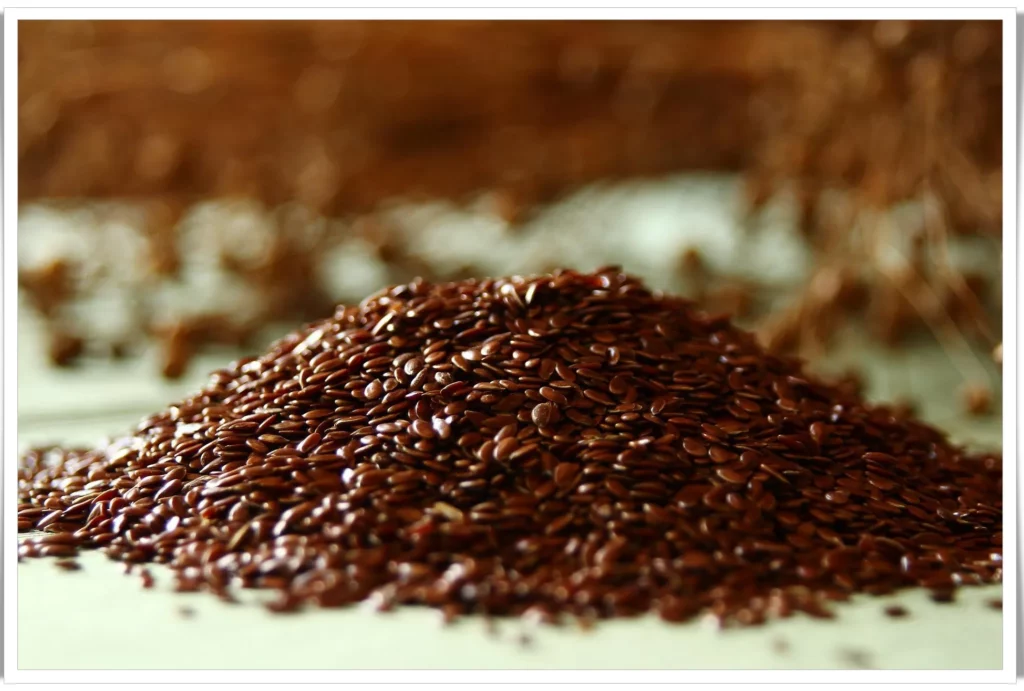4 Benefits Of Flaxseed.
What are Flaxseeds?
Flaxseeds are seeds from the flax plant. They contain omega-3 fatty acids which are essential nutrients for our bodies. The Benefits of Flaxseed are: high in fiber, protein, iron, zinc, calcium, phosphorus, magnesium, and vitamin B6. They are used in cooking, baking, and as dietary supplements.
Flax seeds are not common enough in our dietary habits, yet they contain many very good qualities for the health of the whole organism. Consume some every day!
4 Benefits Of Flaxseed. Everything You Need To Know!

Flax seeds are excellent for our health and, in addition… they are delicious! There are almost 200 species of flax, almost all of them wild. For the diet, one must choose between brown and blond. In this article, you will learn some of their benefits.
4 Health Benefits of Flaxseed
1. Great for Gluten-free Diets
Flax does not contain gluten. So for those allergic or intolerant to gluten, present in many foods containing wheat, you can trust flax. Eat it crushed or ground to assimilate all its benefits. A pepper or coffee mill will do that very well. Indeed, the whole seed has a hard shell, which is very difficult – if not impossible – to digest for the organism, which will reject it. That’s a pity!

Benefits Of Flaxseed
Flaxseed is a good source of fiber, protein, and omega-3 fatty acids. It is also low in carbs and can be easily added to a variety of foods. Some potential health benefits of flaxseed include:
- Heart health: The omega-3s in flaxseed may help reduce the risk of heart disease by decreasing blood pressure and improving cholesterol levels.
- Digestive health: The high fiber content of flaxseed may help improve bowel regularity and prevent constipation.
- Cancer prevention: Some studies have suggested that the lignans in flaxseed may have anti-cancer properties, though more research is needed to confirm this.
- Diabetes management: The fiber and alpha-linolenic acid (ALA) in flaxseed may help regulate blood sugar levels, making it a potentially useful addition to the diet of people with diabetes.
- Weight management: The fiber in flaxseed may help you feel full, which can help you control your weight.
2. Source of Vitamins
Some call it a super-seed! It improves the cardiovascular and digestive systems, prevents certain cancers, and decreases the risk of osteoarthritis and menopausal problems. And that’s not all. Flaxseed is also a valuable source of minerals, essential fatty acids, and nutrients like vitamin E, an antioxidant beneficial to mucosal and skin cells. Vitamins B2, B3, and thiamine (B1), which are also essential for the metabolism of carbohydrates, and vitamins B5 and B6 are also among the many nutritious agents in flax.
Flaxseed is a good source of several vitamins and minerals, including:
- Thiamin (vitamin B1): helps the body convert food into energy
- Magnesium: helps regulate heart rhythm, muscle and nerve function, and bone health
- Phosphorus: helps build strong bones and teeth
- Copper: helps form collagen and absorb iron
- Manganese: helps form connective tissue and bone, and aids in metabolism
Keep in mind that the vitamins and minerals in flaxseed are present in small amounts. While they can contribute to your overall nutrient intake, it is important to consume a variety of nutrient-dense foods to meet your nutritional needs.
3. Helps to Lose Weight
Do you want to lose weight without losing a fortune in products far from natural? Flax seed can become a good ally to you. It is, indeed, a fat-burning food. Thanks to its dietary fiber, it gives you an impression of satiety. You nibble less and your body claims less sugar. Each day at mealtime, take three teaspoons of ground flaxseeds with a glass of water. You can also choose to incorporate your daily ration into your yogurts, cereals, eggs, or salads. Be constant. Follow this diet for two months, then take a break for three to four weeks before resuming. This will not, however, save you from exercise and a balanced diet!
4. Anti-Constipation Companion
Flaxseed contains a lot of fiber, so it is an effective natural treatment against constipation. Mix ten grams of ground seeds coarsely mixed with water (150 ml) and drink. Repeat two to three times daily. Constipation will diminish after two or three days. Be careful, however, if you have diverticula or if you suffer from irritable bowel syndrome (IBS): this could cause inflammation due to the insoluble fiber contained in the seed.
You can also find valuable information about the 6 Healthy Foods High in Vitamin ”D” if you click here!

Benefits Of Flaxseed
Flax seeds - nutritional values
What interests us about flaxseed is its composition and nutritional value.
- rich in fats: especially Omega 3 fatty acids (alpha-linolenic acid/ALA), but also Omega 9 (oleic acid) and Omega 6 (linoleic acid).
- source of fiber
- low carb protein source
- vitamins: B (a lot of B1, but also B9, B6, B3, B5, and B2), vitamin K, E, and C.
- minerals: manganese, phosphorus, magnesium, iron, calcium, potassium, copper, selenium.
- essential compounds for the functioning of the body: lignans (800 times more than other foods), phytosterols, and ferulic acid.

Benefits Of Flaxseed
They do not contain gluten!
In short, look what you find in a tablespoon (approx. 10 g) of flax seeds (remember that the recommended dose is 50 g/day):
4 Benefits Of Flaxseed. Everything You Need To Know!
- 45 calories
- 4g fatty acids
- 0.25g saturated fat
- 3.5g carbs
- 3g fiber
- 2g protein
- 2.5g sodium
- 40mg calcium
- 0.25g of iron
Other Benefits of Flaxseeds
Omega-3 Fatty Acids
A diet rich in Omega-3 fatty acids helps maintain the health of the heart, brain, and circulatory system reduces the risk of inflammation, and relieves depression. Omega-3 fatty acids are also found in foods of plant origin, but also in those of animal origin, but the human body cannot produce them. The most important source is fatty fish, and in fish are found the three acids – DHA, EPA, and ALA.
Flax seeds and oil contain a large amount of ALA fatty acid, including pumpkin, poppy, and sesame seeds containing Omega-3, but in smaller quantities.
It is important to remember that when the diet lacks these polyunsaturated fats, we can face: decreased growth process, liver and kidney damage, dry skin, loss of elasticity, and more.
The fish oils in the composition of these supplements, as well as minerals and vitamins (vitamins B1 and B6, vitamin E), contribute to the proper functioning of the body and to an optimal state of health.
4 Benefits Of Flaxseed. Everything You Need To Know!
Cholesterol Levels
Flax seeds are the richest plant source of omega-3, an antioxidant known for their beneficial effects on the heart, bone system, cholesterol, and blood pressure.
Due to these benefits, flaxseed is an excellent alternative to fish oil and salmon. In addition, flax seeds also have the advantage of providing an important intake of fiber, vitamins (especially those from the B complex), and minerals. The effects of a flaxseed diet are extremely varied and manifest shortly after starting treatment. For those who want to lose the extra pounds gained, a diet with a significant intake of flaxseed helps in weight loss. Include flaxseed in your diet at least four times a week.

Benefits Of Flaxseed
Eat them whole or ground.
Sprinkle them over salads: 2-4 teaspoons a day should ensure a balanced intake of essential fatty acids “for weight loss”.
Alpha-linolenic Acid
Flax is also unique because it’s one of the richest sources of plant-based omega-3 fatty acids, called alpha-linolenic acid (or ALA).
Alpha-linolenic acid (ALA) is an n-3 polyunsaturated fatty acid that has been found in studies to help: decrease the incidence of coronary heart disease and hypertension improve platelet function reduce inflammation promote healthy endothelial cell function protect arterial function reduce heart arrhythmias ALA also seems to help support normal development infants and children.
Reduce the Risk of Heart Disease
Fiber, lignan, and Omega-3 are contained in flax seeds and have many good components, they are gaining popularity especially due to 3 main ingredients: Omega-3 essential fatty acids – those “good” fats that protect the heart (every tablespoon of flax seeds contains 1.8 grams of Omega-3); Lignan – which has antioxidant and estrogen qualities (flax seeds contain 75-800 times more lignan than other edible plants); fibers – flax contains both soluble and insoluble fibers. Flax seeds have been linked to health benefits, such as improved digestion and a reduced risk of heart disease, type 2 diabetes, and cancer.

Benefits Of Flaxseed
Digestive Health
One of the most well-researched benefits of flaxseed is its ability to promote digestive health.
You’ll also benefit from getting lots of magnesium from flax, another nutrient that promotes digestive health by hydrating stool and relaxing the muscles in the GI tract. Like flax, chia can absorb lots of water, contribute to the feeling of fullness, prevent constipation, and help with digestive health.

Benefits Of Flaxseed
The Health benefits of adding them to your diet include balancing blood sugar levels, reducing high LDL “bad cholesterol,” decreasing high blood pressure, promoting satiety and weight management, and contributing to gut/digestive health. Other Benefits of Flaxseed:

Benefits Of Flaxseed
Rich Source
The analysis suggests that flaxseed oil may affect people differently and, therefore, more research is needed to determine its effects on inflammation in the general population.2 Flaxseed oil contains linoorbitides, compounds known for their cancer-fighting and antioxidant properties.3 The oil is also a rich source of dietary lignans or compounds found in plants, which have been found to reduce the risk of breast cancer.4 Alpha-linolenic acids (ALA) in flaxseed oil may also slow down the growth of cancer cells and even kill them.
Reduce Postmenopausal Women's Effects
Studies with flaxseed and its bioactive components have been performed with postmenopausal women, showing positive effects, including the hypocholesterolemic and antidiabetic effects of supplementation (Patade et al. 2008; Bloedon et al. 2008).
In a short 6 weeks study, a slightly lower bone resorption marker (tartrate-resistant acid phosphatase) was observed in postmenopausal women receiving flaxseed. Conversely, most studies have shown no effect of flaxseed consumption on bone mineral density, bone mineral content, or bone turnover in postmenopausal women.
Flax Oil
Flax oil Linseed oil Flaxseed oil contains many active and helpful compounds, including Omega-3 fatty acids, healthy proteins that may decrease risk factors of heart disease, and fiber to prevent digestive issues and constipation.
Benefits Of Flaxseed

Benefits Of Flaxseed
Hemp oil helps in hormonal balance. It contains organic compounds called prostaglandins, which help the body function properly.

Benefits Of Flaxseed
Prostaglandins support smooth muscle contraction, control body temperature, and reduce inflammation. The oil is also rich in gamma linoleic acid, which is important for hormonal health and is recommended for women suffering from PMS. This oil can also reduce menopausal symptoms.
Hemp oil can prevent certain forms of cancer. Due to fatty acids and gamma linoleic acid, which naturally balance the level of inflammation and help strengthen the immune system, hemp seed oil helps prevent cancer.
Watch this short video ”Let The Food Be Your Medicine”, we will be learning how to live longer and be healthy by implementing good food and healthy acting based on long oriental experience!
Medical NewsToday
Try This! It's a very popular Blog, where you can find very useful information about health.
Conclusion
Under certain conditions, flax seeds can slow down the absorption rate of oral medications or other nutrients if they are taken simultaneously. Pregnant women must limit their consumption of flax seeds due to the content of substances that act in the same way as estrogens.
Some of the most common side effects that are encountered when consuming flax seeds are intestinal flatulence with gas accumulation, flatulence, stomach pain, nausea, diarrhea, bloating, or constipation. It is important that those who include flax seeds in their diet drink enough water because the dietary fibers can upset the transit if you do not consume enough liquid.
If you have questions or want to comment, please leave them below and I will answer as soon as I can. Thank you for reading ''4 Best Benefits Of Flaxseed. Everything You Need To Know!''





A fascinating discussion is definitely worth comment. I do believe that you should publish more about this issue, it may not be a taboo matter but usually folks dont speak about such subjects. To the next! Cheers!!
Yes! Thank you!
Pingback: 6 Healthy Foods High in Vitamin ”D”, All You Need To Know! - bc-educate
It’s really a nice and helpful piece of information.
I am glad that you just shared this helpful information with
us. Please stay us informed like this. Thanks
for sharing.
Thanks for your blog, nice to read. Do not stop.
Thank you very much for sharing, I learned a lot from your article. Very cool. Thanks. nimabi
I don’t think the title of your article matches the content lol. Just kidding, mainly because I had some doubts after reading the article.
Thanks for sharing. I read many of your blog posts, cool, your blog is very good.
Wow, wonderful blog layout! How lengthy have you been running a blog
for? you make blogging glance easy. The overall look of your site is magnificent, as smartly as the content material!
You can see similar: dobry sklep and here dobry sklep
I was suggested this blog by my cousin. I’m not sure whether this post
is written by him as no one else know such detailed about my trouble.
You are amazing! Thanks! I saw similar here: sklep online and also
here: sklep online
This info is priceless. Where can I find out more? I saw similar here: Sklep internetowy